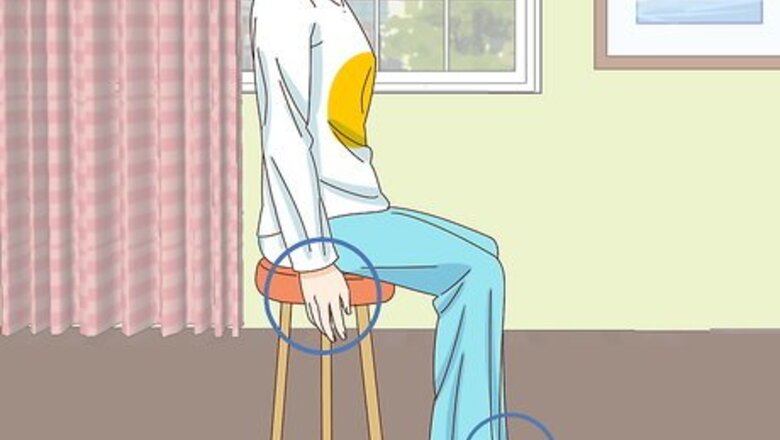
views
Breathing Slowly to Combat Shortness of Breath
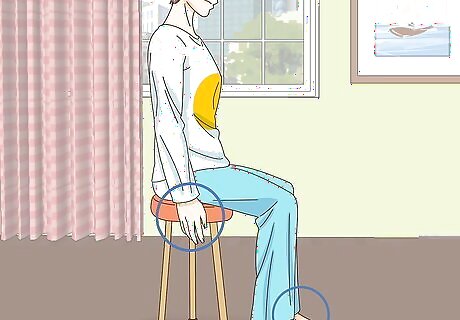
Situate yourself in a comfortable position. If your clothing is too tight, try to loosen it. Place your feet flat on the floor if you're standing or sitting, aiming for shoulder-width apart. Put your arms at your side, either on the arms of a chair or hanging loosely down. If you're in a reclined position, get on your back with your hands palms-up by your side.
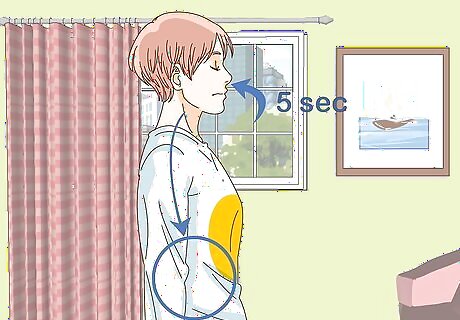
Breathe in through your nose, filling your belly. Take a deep breath in, letting it fill you up. Pull enough air in that it feels like a deep breath but don't try to force extra air in. Try counting to 4 or 5 as you breathe in. It can help to imagine that you're breathing in calmness. You can even give it a color, like you're breathing in calm, blue air. Often, when you're having an anxiety attack, your breathing is too shallow and you're almost hyperventilating. Taking deep, slow breaths can help calm you down. Try putting your hand on your belly so you can feel it expand. Shallow breathing can build up slowly over time before a panic attack or even cause it.
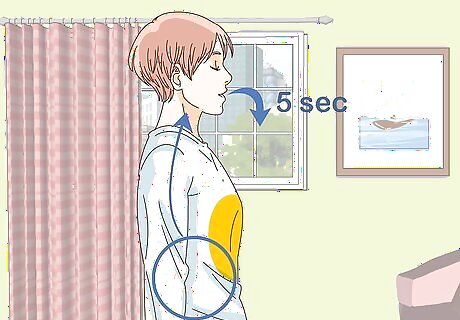
Breathe out through your mouth and count to "5." Let the breath out slowly. To help slow yourself down, try gathering your lips when you breathe out, just like you're trying to whistle. Imagine you're breathing out your anxiety. Try giving it a color, too, such as red.
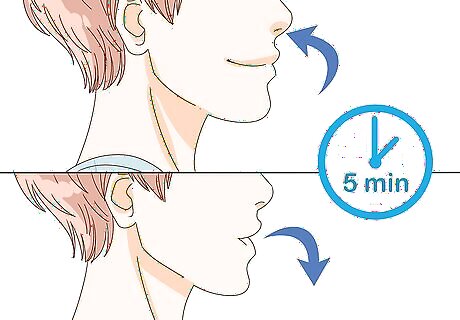
Keep breathing this way for about 5 minutes. This slow, deep breathing technique should help calm down your anxiety, though you may need to use some additional techniques, too. At the same time, it will help you deal with the shortness of breath. Try to keep it up for a few minutes for it to fully take effect. It's a good idea to work on this breathing technique even when you're not having an anxiety attack. It can help you slow your breathing overall, which is good, since hyperventilation (fast breathing) can lead to anxiety attacks, and of course, you want to avoid those triggers as much as possible.
Getting through a Panic Attack
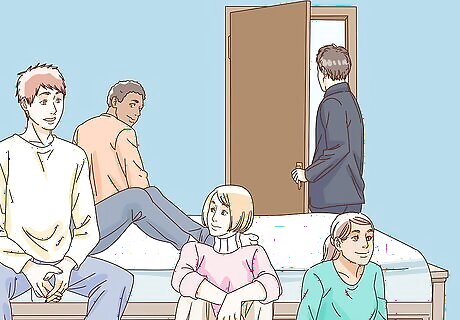
Leave the room or situation if you need to. Most people won't even know you're having a panic attack, so try not to make yourself more anxious by worrying about that. If you're in a situation that's giving you anxiety, you can just take yourself out of the situation. Don't be afraid to walk away; everyone will likely just think you're taking a bathroom break or just need a breath of air. However, there's no reason you can't stay in the room or area if you think you can cope. In fact, doing so may help diminish your anxiety in that situation next time. Even if the situation you're in isn't causing your attack, you can still take a break if you need to. Many attacks don't have a specific trigger, but changing your situation may help. For instance, if you're driving, you may want to pull over. If you were asleep, you may want to get up and walk around.
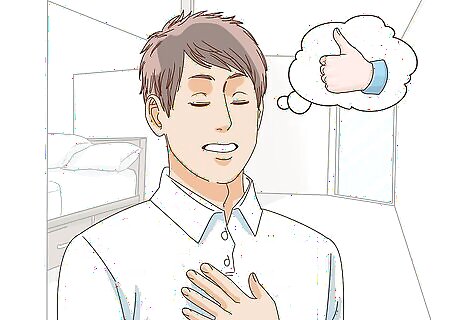
Tell yourself that your symptoms aren't going to hurt you. Panic attacks can be terrifying, but they will pass. Focus on that fact, and work on breathing through it. You can do it, even when it seems like you're anxiety will take over. You could say to yourself, "This will pass. I've gotten through it before, and I can get through it now." Try not to tell yourself to "Stop panicking!" or anything that focuses on your symptoms. That can make the problem worse.
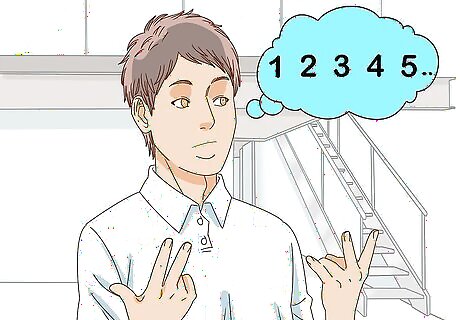
Put your attention on something besides your symptoms. Taking your mind off your anxiety can help calm you down. You can use any little trick, such as counting by fives, singing a familiar song in your head, or trying to name the state capitals. Just try anything that makes you think a little bit and refocuses your attention away from the panic attack. You could also try naming all the members in your family or going through your favorite recipe in your head. Alternatively, try running through the scenes of your favorite movie in your head.
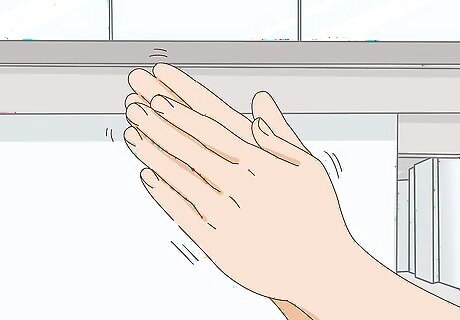
Ground yourself to draw yourself out of your anxiety. "Grounding" just means using your senses to bring yourself out of panic mode. For instance, you can name all the things you smell or all the things you can see. Rub your hands together and focus on the sensation, or use a worry stone. Alternatively, focus on the individual sounds you can hear one-by-one or even what you can taste. Try naming all the colors you can see or go through each sense one by one.
Managing Your Anxiety

Seek professional help from a therapist. A therapist can help you learn strategies to deal with panic attacks. Plus, they can help you work through some of the things that cause you anxiety. There's no shame in seeing a therapist! Lots of people need help coping with anxiety and other related issues. If you're not sure who to see, ask your friends and family members for a recommendation. Most insurance covers at least some therapy so check to see if yours does.
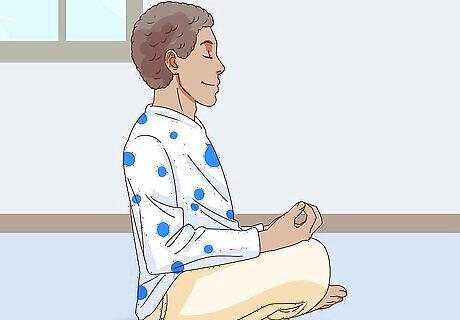
Try relaxing activities, such as yoga and meditation. Practice these activities weekly or even daily, and they can help relieve stress and anxiety. You can even use techniques you learn for meditation to help with anxiety attacks. Find yoga classes at your local gyms or yoga studios. You may even find classes through your local parks and recreation department.
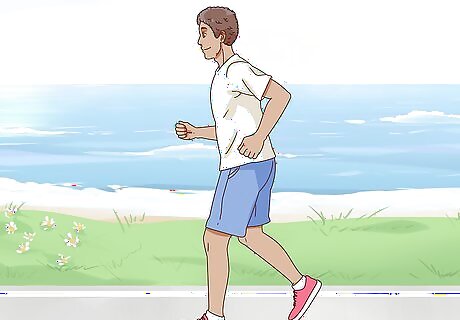
Aim for 30 minutes of exercise most days of the week. Exercise is a great stress reliever, so try to make it a priority in your life. Any exercise is fine, from walking to swimming to playing basketball with your friends. If you need to, break up your exercise into 10-minute increments throughout the day to make it easier to get it in. You don't have to hit the gym to exercise. Try incorporating it into your day in small stints. Take the stairs or park away from the front door when you go to the store. Things like housework and gardening also count for exercise.
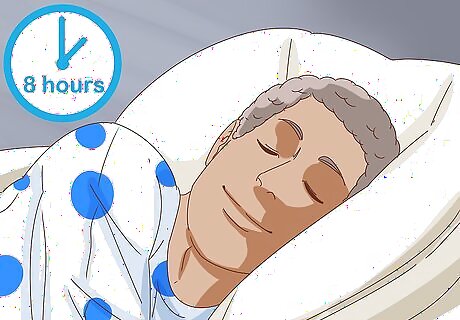
Get 7-8 hours of sleep each night. Anxiety can certainly make it more difficult to sleep, but rest is important for keeping your anxiety at bay. Try relaxation techniques at night to help calm your mind for sleep. If you have trouble going to bed on time, set an alarm for an hour before you need to be in bed. That way, you have that time to shut off your electronics and prepare your mind for bed. Start a relaxing routine before bedtime, such as having a cup of herbal tea, taking a bath, or reading.
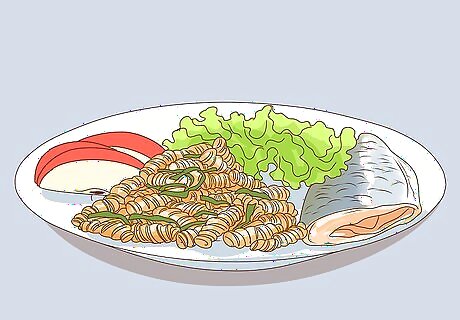
Try to eat a healthy diet with fruits and veggies. Some people find that eating healthier helps with their anxiety levels. Fill your plate up halfway with fruits and veggies. Add in a lean protein, like fish, beans, or chicken, and then include a whole grain, such as whole wheat pasta, quinoa, bulgur, or brown rice. Add in lean dairy for variation. Keep in mind that low-sodium canned and frozen fruits and vegetables are just as nutritious as fresh; they can be much cheaper and easier to fix in this form.
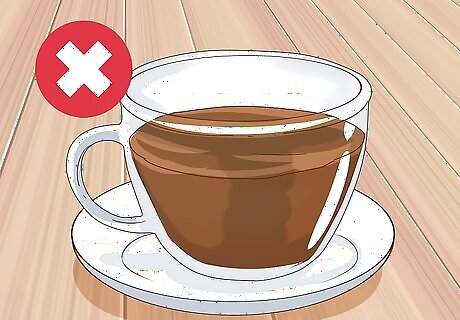
Slow down on caffeine or stop it altogether. Caffeine is another addiction that's hard to quit, but doing so can be beneficial to your anxiety. To cut back on caffeine, start weaning yourself off it slowly. Lower how much you eat or drink a little bit each day so you won't be as affected by withdrawals. Caffeine can cause your anxiety to increase. In fact, some people find caffeine triggers anxiety attacks.
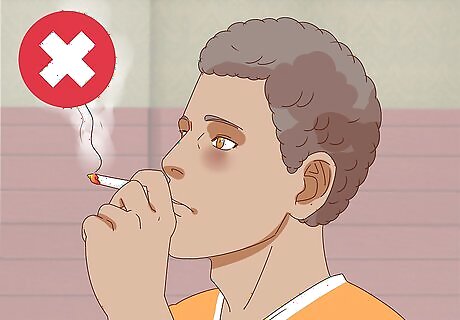
Quit smoking to lower your anxiety levels. Smoking contributes to a variety of health problems, including your anxiety levels. While it's hard to quit, it may help you manage your anxiety. Plus, smoking may be contributing to your shortness of breath. If you've been thinking about quitting, now may be the time to do it. Talk to your doctor about getting nicotine patches or gum to help you quit. Tell your friends and family you want to quit so they can help support you when you're having cravings. Join a quitter's group to learn coping techniques.
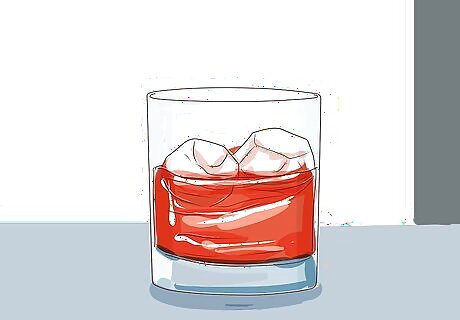
Avoid alcohol and recreational drugs. You may have tried these substances to lower your anxiety levels, which is understandable, but in fact, they can actually increase your anxiety overall. Try to avoid alcoholic beverages altogether if you can to help keep your anxiety in check. Alcohol and other drugs can affect the balance of chemicals in your brain, which is why they may make your anxiety worse. Even over-the-counter drugs like diet pills can raise anxiety levels because they're stimulants. Stimulants can make your heart beat faster and cause other physical symptoms; in turn, that can bring on an anxiety attack.
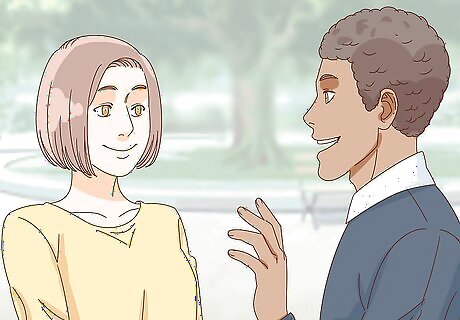
Meet up with people you like in person. Anxiety can be isolating, making you want to stay home and hide out, particularly if you have social anxiety or your agoraphobic. However, the connections you have with other people can help relieve stress and anxiety. Try to meet up with people you like at least once a week. If you don't have anyone to hang out with, try taking a fun community college class or a workshop at your local library to meet people.




















Comments
0 comment